| Srl | Item |
| 1 |
ID:
159354
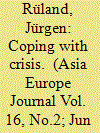

|
|
|
|
|
| Summary/Abstract |
The key argument of this article is that during serious crises and external shocks, societal actors do not necessarily follow the predictions of theories on ideational change. This literature argues that crises and external shocks spur ideational change as expectations associated with the old order are no longer met. A study of the Association of Southeast Asian Nations (ASEAN) shows that the Asian financial crisis of 1997/1998 stimulated a reform debate but that this discourse did not facilitate paradigmatic changes in the region’s repository of cooperation norms. What at first sight appeared to be an accelerating Europeanization of Southeast Asian regionalism proved to be a process involving the retention of major elements of the region’s “cognitive prior.” New ideas of regional integration have at best been emulated or localized, but have not led to a thorough transformation of Southeast Asian cooperation norms. This must be attributed to the entrenched nature of the region’s cognitive prior epitomized by the worldviews of political decision-makers who regard the external world as essentially hostile. This belief has been reproduced many times in the political experiences of the region’s foreign policy elites—not least by the Asian Financial Crisis—thus confirming the ideational orthodoxy that national sovereignty provides the best protection for nation states. A deepening of regional integration is faced with major ideational obstacles under these conditions.
|
|
|
|
|
|
|
|
|
|
|
|
|
|
|
|
| 2 |
ID:
180068
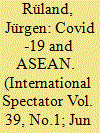

|
|
|
|
|
| Summary/Abstract |
The Association of Southeast Asian Nations (ASEAN) has responded to the Covid-19 crisis in a path-dependent way. The latter is shaped by a time-tested repository of cooperation norms, which give precedence to national sovereignty. Hence, belated, ad hoc and largely declaratory collective responses to the Covid-19 crisis are business as usual and are unlikely to have disruptive effects on ASEAN’s operations. Yet member countries’ emergency measures are intensifying ongoing processes of democratic backsliding and will have negative repercussions on the grouping’s inclusiveness. They will impair advancements towards a people-oriented ASEAN. Regional cohesion will be further jeopardised by relations with China, which have intensified due to Chinese “mask diplomacy”, but are also increasingly influenced by China’s encroachments on ASEAN member states’ claims in the contested South China Sea.
|
|
|
|
|
|
|
|
|
|
|
|
|
|
|
|
| 3 |
ID:
167469
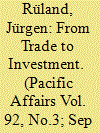

|
|
|
| 4 |
ID:
167594
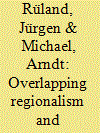

|
|
|
|
|
| Summary/Abstract |
This article examines the phenomenon of overlapping regionalism in South and Southeast Asia. Theoretically it rests on Thomas Pedersen’s ‘ideational-institutionalist realism’ approach. We argue that in the two sub-regions under study the proliferation of regional organizations has been greatly stimulated by hegemonic and counter-hegemonic dynamics involving Asia’s largest powers, China and India. We claim that sceptical world views highlighting vulnerability, victimization and national survival are deeply entrenched in the mental maps of the regions’ foreign policy elites. Regional institution building is thus informed by the tenets of realism. We trace how and why China and India seek to establish ‘cooperative hegemonies’ by building regional institutions for incorporating their neighbours into their sphere of influence while keeping rival powers at bay, and also show why smaller states in the region join these regional fora.
|
|
|
|
|
|
|
|
|
|
|
|
|
|
|
|
| 5 |
ID:
144283
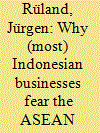

|
|
|
|
|
| Summary/Abstract |
By the end of 2015 the Association of Southeast Asian Nations (ASEAN) had ushered in a common market, the ASEAN Economic Community (AEC). However, the groups most affected by it – small businesses – were bypassed in the decision-making process. They are the victims of a selectively inclusive state corporatism which member countries have transferred from their domestic political system to the regional level. In this article I argue that the decision to create the AEC was promoted by ASEAN governments together with foreign economic and local corporate interests. This coalition was able to frame the AEC in a way that small businesses perceived it as a win-win scheme. Empirically the article focuses on Indonesia.
|
|
|
|
|
|
|
|
|
|
|
|
|
|
|
|